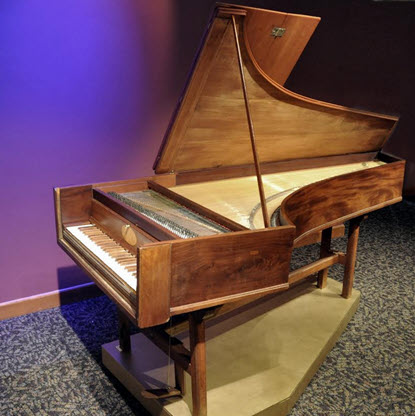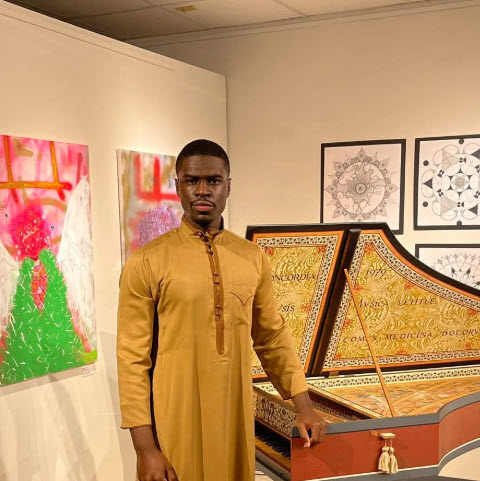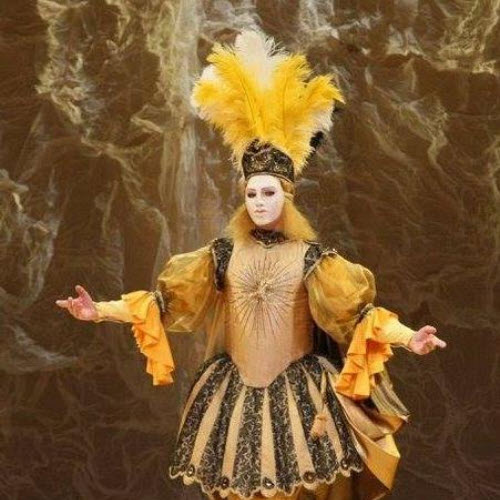by Kyle MacMillan
Published September 21, 2025
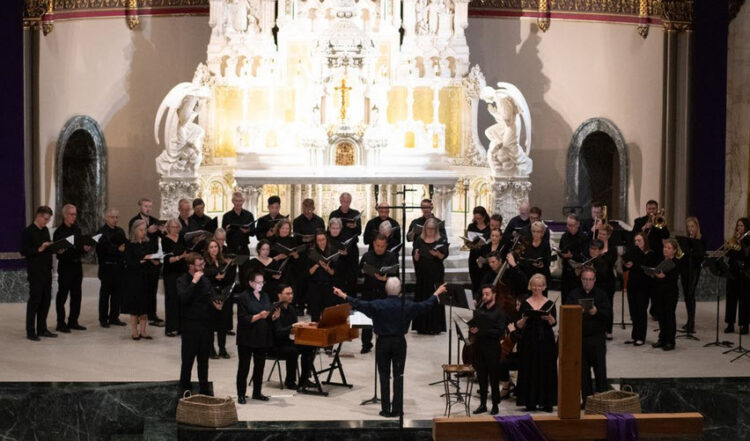
When the Baroque Band, a period instrument ensemble founded by British violinist Garry Clarke, folded in 2016 after nine years, it left a void in Chicago’s early-music scene. Third Coast Baroque tried to fill that slot until it, too, collapsed in 2024.
Now a new group, Bach in the City, is ready to step up as it launches its debut season Oct. 3. Its artistic leaders, conductor Richard Webster and harpsichordist Jason Moy, believe they have advantages that will give the ensemble sticking power. Among these are established funding sources and knowledge of the intricacies and strengths of Chicago’s immense classical music landscape.
Another big plus is that the Windy City’s early-music scene has significantly evolved since 2016, with an exciting influx of new talent upon which this ensemble can draw. When the Haymarket Opera Company, which focuses on period productions of 17th- and 18th-century repertoire, performed a concert version of Handel’s Alcina recently, all 14 players in the orchestra’s string section and its two horn players were Chicago-area residents.
“I think we are bringing something really wonderful to the Chicago early-music scene,” Bach in the City’s Moy said. “And what I’m most excited about, it’s an opportunity to bring together a group of really talented and like-minded musicians built on mutual respect and a commitment to Bach.”
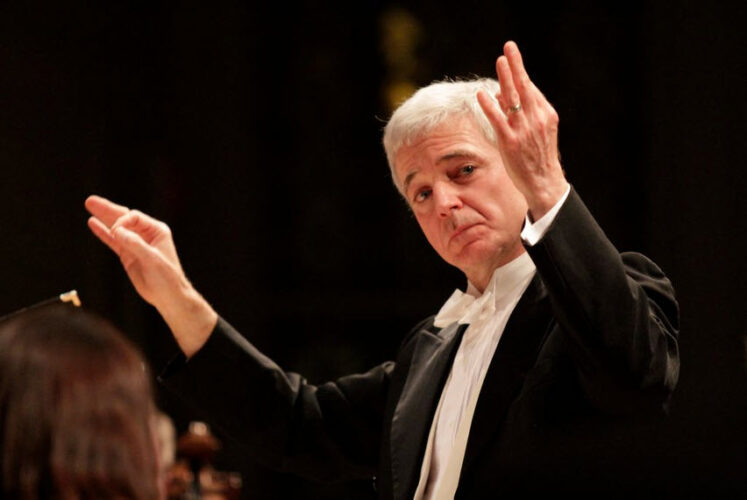
Bach in the City is not a completely new organization. Instead, it is a kind of reimagining of a group that existed for a half century — the Bach Week Festival, which presented a set of concerts devoted to its namesake each spring from its home based in Evanston, a Chicago suburb. At the urging of Webster, who became music director shortly after the festival’s founding, the board announced the disbandment of the organization in 2024. “It came to my soul that it was time not to do this,” he said, noting it was becoming increasingly difficult to recruit board members and find financial support. “It’s not like we were in trouble, but it was getting harder, and I could see that it was wearing out the people who were doing everything. I wanted to give them some relief.”
Bach Week marked its end on May 5, 2024 — exactly 50 years to the day and hour of its first concert — with a performance of Bach’s B-minor Mass at Evanston’s St. Luke’s Episcopal Church, where the festival started and where Webster had been organist and chorus master since the 1970s. At the after-party, some of the orchestra musicians and chorus members approached him. “They said, ‘This is just too good. We want to keep going,’” he recalled.
Webster responded that if continuing was really important to them, it could only happen if they found seven new board members and at least two or three new sources of steady funding. “I called their bluff, and they came through — unbelievably.”
Webster, who now splits his time between Chicago and Boston, where he was director of music at Trinity Church from 2010-22, felt that if the organization were to continue it needed to be something fresh and different. “Not just Bach Week 2.0,” as he called it.
To that end, he and his supporters reconfigured the organization as a fall-to-spring series based in Chicago. But perhaps the biggest change was philosophical: instead of playing modern instruments, which the Bach Week Orchestra had used for 50 years, the refreshed Bach in the City would play on period instruments.
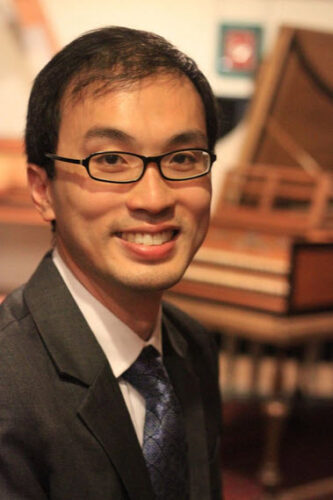
To help with that transition, Webster invited Moy to serve as associate music director. A Chicago native, Moy is on the music faculty at DePaul University, where he leads the school’s Baroque ensemble. He also teaches at Roosevelt University. In addition, the harpsichordist performs across the U.S., including regularly appearances at the prestigious Boston Early Music Festival.
Bach in the City fills a glaring gap in Chicago’s early-music scene. There are several other important groups, each with a different bent. The Newberry Consort focuses primarily on Medieval and Renaissance music. Haymarket is an opera company. Music of the Baroque programs masterworks from the Baroque and Classical eras but not on period instruments.
Most similar to Bach in the City’s niche is perhaps Apollo’s Fire, a nationally acclaimed ensemble based in Cleveland that began offering a satellite series in Chicago in 2021-22. Its 2025-26 line-up features four programs, each presented in two or three Chicagoland locations. Notably, Apollo’s Fire taps a broader or multicultural repertoire, sometimes far from the familiar Baroque masters that are central to Bach in the City.
Each of these other groups “has its own special, distinctive personality, character, and mission,” Webster said. “What we have that is unique is that we are locally based. Suddenly, now, we have a critical mass of period-instrument players attracted to Chicago, and that was not true a decade ago.”
When planning Bach in the City’s debut, the music director quickly zeroed in on St. Vincent de Paul Church, in the Lincoln Park neighborhood, as a possible home base. It had successfully served in 2011 and 2012 as the venue for the first two of the six years of the Bach Project, which annually presented a major choral works by the composer. The church had several advantages going for it, including its location and fine acoustics. Webster approached the church’s organist and director of music, Robert Beatty, an old colleague, and asked if he would consider a Bach Week-type organization at St. Vincent de Paul. “Absolutely. When do we start?” is what Beatty told Webster without hesitation.
The church provided a room for the old Bach Week archives and musical scores, which had been transferred to Bach in the City, and Beatty spearheaded the recruitment of the group’s operations manager, Ana Miranda-Gonzalez. “So, suddenly we had a new enterprise, and we decided we would name it something new — Bach in the City — and off we went,” Webster said. The revamped organization put together a trial concert in March titled Bach and the Venetians that drew 300-400 people. They deemed it a success.
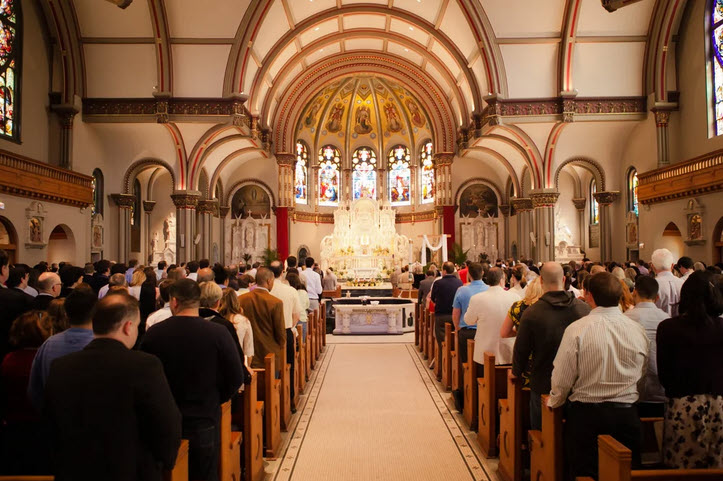
Ambition and Caution
For its first full season, Bach in the City is not starting timidly. With the group’s two artistic leaders working out the overall framework and Moy filling in many of the specific selections, they have put together an ambitious three-concert line-up that is anchored by the city’s first-ever presentation of Malcolm Bruno’s reconstruction of Bach’s St. Mark Passion, the lost BWV 247. “I cannot even tell you how excited I am,” said Webster, who will conduct the performance on March 20, 2026. Featured will be a 20-member orchestra and Bach Week’s 40-voice chorus, which has smoothly transitioned to this new organization. “The chorus was one of the bright lights of the Bach Week Festival,” he said. “Those people were so talented and dedicated, and they volunteered. That’s an amazing combination of traits.”
The St. Mark Passion is British musicologist Bruno’s best-guess reconstruction of the 1731 work. The original score is lost, but it is known that Bach recycled music to set the still-extant libretto by Christian Friedrich Henrici, who wrote under the pen name of Picander. Webster attended the April premiere of this version as part of the Music Before 1800 series in New York, and came away impressed. As has been done in other versions, the texts for the central figure of the Evangelist and choruses for the turba (crowd) were spoken by an actor. But Webster, who has a catalog of hymn settings and other works to his credit, believed those sections needed to be set to music as well and he did just that, striving to replicate Bach’s style. “I am not J.S. Bach,” he said. “I don’t pretend to be anywhere near that, but I know his style and I know what I thought I could produce.”
Bach in the City’s season will open Oct. 3 with Music in Heaven’s Castle, a program featuring 11 musicians, including the soloists for Bach’s Concerto in C Major for Three Harpsichords, BWV 1064. “It’s joy in every single bar. It sounds like bubbly champagne,” Moy said. Setting the tone for the line-up’s “festive, celebratory atmosphere” is Telemann’s Overture Suite in D Major with Ryan Berndt on the natural trumpet. Also featured will be Bach’s Violin Concerto in A minor, BWV 1041, with concertmaster Emily Nebel as soloist.
Nebel moved to Chicago in 2023 to serve as assistant concertmaster of the Lyric Opera Orchestra. While she primarily plays modern instruments, she has also performed regularly with early-music groups, including Arcangelo and Dunedin Consort in England where she lived briefly. “I had heard wonderful things about Bach Week from colleagues who’d participated in the past,” she said via email, “so when Jason approached me about leading two of the projects for Bach in the City’s debut season, I agreed without hesitation.”
Rounding out the line-up is a chamber program on Jan. 11, 2026, titled Bach’s Musical World. In addition to Bach’s Violin Sonata No. 1 in B minor, BWV 1014, are works by Buxtehude, Handel, and Telemann. The performers include flutist Taya König-Tarasevich, violinist Amelia Sie, viola da gamba player Anna Steinhoff, cellist Ana Kim, and Moy on harpsichord.
If this debut season goes well, Bach in the City is eager to keep the concerts coming. “That is our hope, but there is no guarantee,” Webster said. “We have some ideas about what we want to do in 2026-27, but I want to make sure what we offer this season is successful, and we can then build on that.”
Kyle MacMillan served as the classical music critic for the Denver Post from 2000 through 2011. Now a freelance journalist in Chicago, he’s written for many publications, including the Chicago Sun-Times, the Wall Street Journal, and Chamber Music. For the September 2025 cover story in EMAg, he reported on Early Music on Tour. Who’s Buying?

